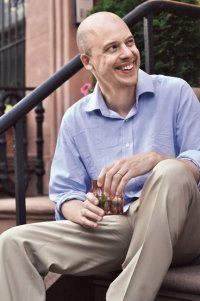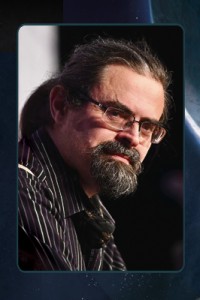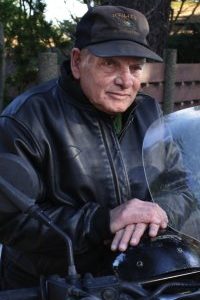Lev Grossman: Insider / Outsider
 Lev Grossman was born and grew up in Lexington MA. He graduated from Harvard and studied for a PhD in comparative literature at Yale for three years, but left before finishing his dissertation. He moved to New York, where he became a journalist and novelist. Grossman is now book critic and senior writer for Time magazine, where he covers the Internet, video games, comics, and other aspects of popular culture. He has written for The New York Times, Salon, Entertainment Weekly, The Village Voice, and numerous other publications. He has served on the board of directors for the National Book Critics Circle, and as chair of their Fiction Awards panel.
Lev Grossman was born and grew up in Lexington MA. He graduated from Harvard and studied for a PhD in comparative literature at Yale for three years, but left before finishing his dissertation. He moved to New York, where he became a journalist and novelist. Grossman is now book critic and senior writer for Time magazine, where he covers the Internet, video games, comics, and other aspects of popular culture. He has written for The New York Times, Salon, Entertainment Weekly, The Village Voice, and numerous other publications. He has served on the board of directors for the National Book Critics Circle, and as chair of their Fiction Awards panel.
First novel Warp was published in 1997, followed by Codex (2004). While both contained references to SF, neither was actually speculative. He turned to full-fledged fantasy with The Magicians (2009), about a highly competitive university for aspiring magicians and the dark side of a Narnia-esque fantasy world. Sequel The Magician King will be published later this year. His only short story to date, ‘‘Endgame’’ (2011), is set in that same world. He is currently a finalist for the Campbell Award for Best New Writer.
Grossman comes from a creative family – his twin brother Austin Grossman is a video game designer and author of the superhero novel Soon I Will Be Invincible, and his sister is the sculptor Bathsheba Grossman.
He lives in Brooklyn with his wife Sophie Gee (married 2010) and two young daughters, one from his previous marriage.
Website: Lev Grossman
‘‘The household where I grew up was, in some ways, quite weird, and as a result my background is weirdly split. My parents were both English professors, and that was how they rolled: they were professors all the time. Literature in English was what the world was about, so my growing up was very much about reading. But I mostly read science fiction and fantasy, and those were not especially approved of in my household.”
…
 ‘‘As a fiction writer, I was not an early bloomer. My first novel was not a success. Second book Codex – I’m fond of it, but it was more of a commercial exercise. The Magicians took me five years and 32 rejections before it was published. It couldn’t have gotten any harder. I started working for Time in 2002, full-time, so I wrote that novel on weekends, at night, and when I was supposed to be paying attention to my kid. (Lily was born in 2004, the same year I started Magicians.) So it was a difficult time. I was neglecting other people, I was neglecting myself, and for what? This book that I had no idea whether it would get published or not.
‘‘As a fiction writer, I was not an early bloomer. My first novel was not a success. Second book Codex – I’m fond of it, but it was more of a commercial exercise. The Magicians took me five years and 32 rejections before it was published. It couldn’t have gotten any harder. I started working for Time in 2002, full-time, so I wrote that novel on weekends, at night, and when I was supposed to be paying attention to my kid. (Lily was born in 2004, the same year I started Magicians.) So it was a difficult time. I was neglecting other people, I was neglecting myself, and for what? This book that I had no idea whether it would get published or not.
‘‘When I talk about the influences that went into The Magicians, I should start by saying that the magic land of Fillory began as Narnia. In the very early days of the first draft, my lead character Quentin was a fan of Narnia, just obsessed with it. That became problematic – it was simultaneously cute and mean-spirited, and probably illegal. And it was constraining, because I wanted the mythology to be different. It’s so much fun to make up stuff, so why let Lewis have all the fun?”
…
‘‘We had to choose between packaging The Magicians for fantasy readers and for literary readers. In some ways, it made sense to skew it literary, because fantasy readers are more adventurous than literary readers. They’ll leave the fantasy aisle to find what they want, whereas not many literary readers will cross over the other way. In the end, I think it went somewhere in-between. Personally, I try not to put it on any shelf. Those categories don’t seem very real to me. They belong to the world of the marketplace, not the real world.”
…
‘‘The new one was fast and intense, a different experience, but I’m really proud of it. It’s a very different book. Half the plot begins several years after the end of The Magicians, and the other half takes place concurrently with The Magicians. You’re not locked into one person’s head this time – the narrative is split between two main characters. There’s a story missing from The Magicians, about Julia – somehow she learns magic on her own instead of being trained at Brakebills. So we go back over the same period of time, but all through Julia’s eyes. You see Quentin enter early on, but this time you see him from outside and get a sense of how other people perceive him. As Julia says, he’s basically a good person who needs to get over himself and have a ton of therapy, probably some drugs, and he’ll be fine. He’s very smart: intellectually overdeveloped, but emotionally underdeveloped.”



 Read the complete interview, and biographical profile, in the July 2011 issue of Locus Magazine.
Read the complete interview, and biographical profile, in the July 2011 issue of Locus Magazine.



Pingback:July 11, 2011 Links and Plugs : Hobbies and Rides
I just read the complete interview in LOCUS (got a copy at Readercon!) and I have an odd biographical question. If mentioning his talented family, why would you not mention that his father, Allen Grossman, is an amazing poet?